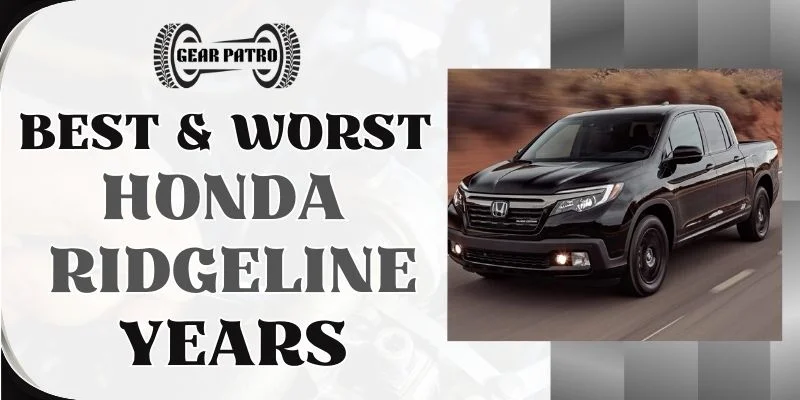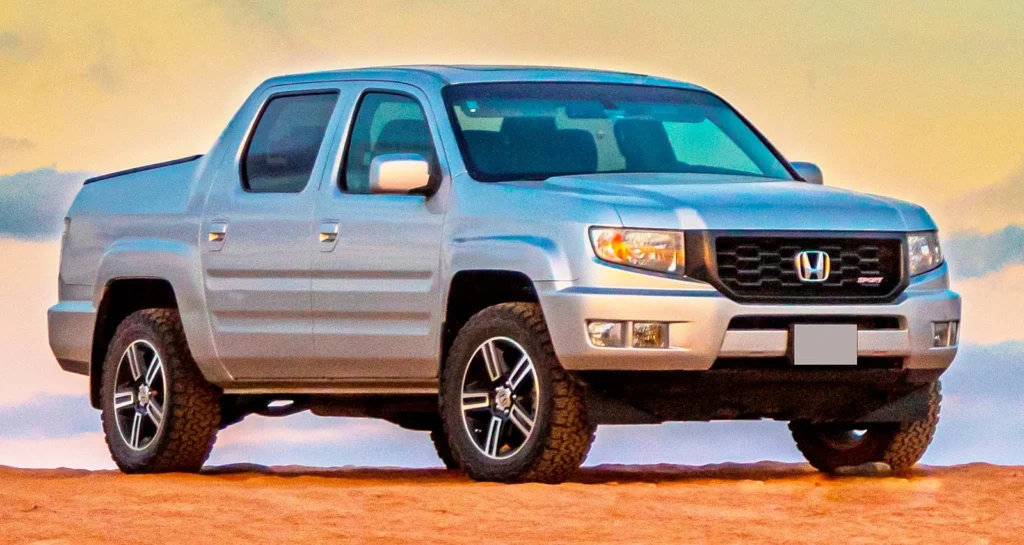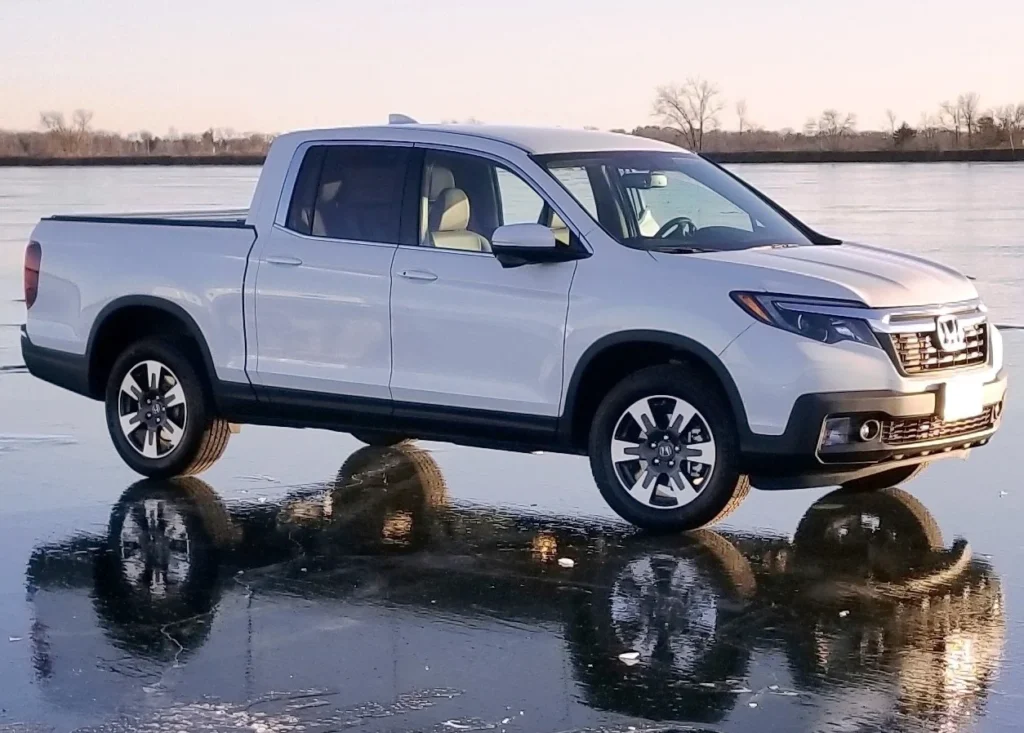To help you avoid choosing the worst Honda Ridgeline model years and pick the best Honda Ridgeline year, we have ranked all Honda Ridgeline models for each generation.
I’ll review all Honda Ridgeline generations in this guide, and provide recommendations on when to buy and when to stay away from the Honda Ridgeline in each generation.

In order to ensure my assessments are thorough and reliable, I’ve used extensive data from reliable sources such as NHTSA and Edmunds to examine every aspect of Ridgeline’s journey.
To help potential buyers and enthusiasts make informed choices, I’ll summarize the reliability scores, safety ratings, common problems reported by owners, as well as recall history.
It’s time to get started.
Honda Ridgeline Generations
With its unibody construction and innovative features, the Honda Ridgeline, which was introduced in 2006, redefined the midsize pickup truck category with its unique design and unmatched versatility.
The first Ridgeline model set new standards in versatility and comfort in its segment with its smooth, car-like ride, dual-action tailgate, and lockable in-bed trunk.
From 2004 to present, here is a list of all Honda Ridgeline generations.
| Generation | Years |
| 1st Generation (YK1) | 2006-2014 |
| 2nd Generation (YK2/YK3) | 2017-Present |
In order to make informed decisions, it is important to understand generational shifts, as they often reflect major advancements.
Honda Ridgeline Best, Neutral, and Worst Years
To determine the best, neutral, and worst model years for the Honda Ridgeline across its years, we take into account a multitude of factors:
After researching and analyzing each model year of the Honda Ridgeline extensively, I have categorized the years into the best, neutral, and worst.
| Generation | Best Years | Worst Years |
| 1st Generation (YK1) | 2009 2010 2011 2012 2013 2014 | 2006 2007 2008 |
| 2nd Generation (YK2/YK3) | 2020 2021 2022 2023 | 2017 2018 2019 |
It is not clear whether there are “Neutral Years” in this example, but they are typically instances where performance, reliability, and owner satisfaction are average when compared with the best and worst years.
A vehicle’s reliability rating can be negatively impacted by factors such as NHTSA recalls. There is a correlation between car reliability and the number of complaints and recalls it has.
Our Honda Ridgeline history will be divided into three categories: the best, the neutral, and the worst.
Best & Worst Years for Honda Ridgeline 1st Generation (2006-2014)
As a unibody pickup truck, the 2016 Honda Ridgeline will offer an unbeatable combination of comfort and utility in its class. Its first generation launched in 2006 broke new ground in the pickup truck segment, offering unprecedented levels of comfort and utility.

Honda Ridgeline models from 2009 to 2014 are the best first-generation models, while those from 2006 to 2008 should be avoided.
The Best Years: 2009, 2010, 2011, 2012, 2013, 2014
The Honda Ridgeline’s best years in its first generation are 2009, 2010, 2011, 2012, 2013, and 2014. They are characterized by fewer owner complaints and high Consumer Reports reliability and owner satisfaction scores.
This Ridgeline featured a powerful and efficient 3.5-liter J35Z5 V6 engine rated at 250 horsepower and 247 lb-ft of torque, combining power and efficiency.
This vehicle was equipped with a 5-speed PSFA automatic transmission from Honda, which offered a smooth driving experience typical of Honda cars. With an average of about 15 city/20 highway mpg, this vehicle was reasonably fuel efficient for its class.
In addition to the base trim, there are three trim levels: RT, RTS, and RTL, with the higher trims including leather upholstery, heated front seats, and premium audio features.
It also featured features like stability control, anti-lock brakes, and side curtain airbags that contributed to its good safety rating.
The Worst Years: 2006, 2007, 2008
Due to many recalls and reported owner issues on NHTSA, 2006, 2007, and 2008 are the worst Honda Ridgeline years to avoid. Among them are:
It was the electrical system and transmission that presented the most problems.
The transmission cooling line’s fitting frequently corroded, causing coolant to mix with transmission fluid, which was frequently the cause of air conditioning failures.
In the long run, this could lead to significant transmission damage, resulting in expensive repairs.
In addition to airbag recalls, short circuits in HVAC systems, fuel leaks, and failures of fuel pumps, these models also experienced a series of other issues.
Combining these problems, especially the transmission issue, led to a significant decline in the reliability of these early models, making them less desirable to potential buyers.
For a list of recalls and complaints regarding Honda Ridgelines from 2006 to 2008, visit the NHTSA website.
Best & Worst Years for Honda Ridgeline 2nd Generation (2017-Present)
With enhanced capabilities and modern features, the Honda Ridgeline’s second generation was significantly improved over its predecessor in 2017.

In terms of Honda Ridgeline years, 2017-2019 models are the most dangerous, while 2020 and beyond are the best years to buy a second-generation Honda Ridgeline.
The Best Years: 2020, 2021, 2022, 2023
Throughout our research, we found that 2020, 2021, 2022, and 2023 are the best years to buy the second-generation Ridgeline.
It is equipped with a 3.5L J35Y6 V6 engine with 280 hp and 262 lb-ft of torque, as well as an automatic 9-speed transmission from ZF.
Despite the Ridgeline’s size, the truck’s fuel efficiency is excellent for a mid size truck, with an estimated 19 mpg in the city and 24 mpg on the highway.
As the years went on, the trim levels evolved to include the Sport, RTL, RTL-E, and Black Edition, which offered more luxury features and more technological advancements.
Honda Sensing, the safety suite of safety technologies, and premium audio systems are standard on the RTL-E and Black Edition.
A key objective of this model is safety, which is enhanced by features such as collision mitigation braking, lane departure mitigation, adaptive cruise control, and lane-keeping assist.
The Worst Years: 2017, 2018, 2019
Is there a reason why you should buy a Honda Ridgeline in 2017 or 2018 or 2019? My investigation has confirmed that 2017-2018, and 2019 are the worst years to buy a second-gen Honda Ridgeline. The reasons are as follows:
The electrical systems of these models were plagued with problems; for example, the instrument clusters flickered, infotainment systems malfunctioned, and the transmission shuddered and brakes failed to perform properly.
Fuel injector failures were also commonly responsible for triggering the “Emissions System Problem” warning light.
As a result of water leakage into the rear wiring harness, the rearview camera on these models was not functional, and the stability assist did not work despite warnings, and the engine was damaged due to wear on the connecting rod bearings, a cracked fuel pump feed port leak, and a broken hood latch.
A recall for potential timing belt and fuel pump failures has been issued for the 2019 Honda Ridgeline.
Recalls and complaints for 2017-2018 Honda Ridgeline can be found on the NHTSA website.
Best & Worst Honda CR-V Years | Years To Avoid
Best & Worst Honda Civic Years | Years To Avoid
Best & Worst Honda Accord Years | Years To Avoid
Best & Worst Honda Odyssey Years | Years To Avoid
Best & Worst Honda Pilot Years | Years To Avoid
Best & Worst Honda Fit Years | Years To Avoid
Conclusion
Based on our detailed guide, 2009-2014 and 2020-2023 Honda Ridgeline models are the best to consider, as both have very good reliability and advanced features.
The Honda Ridgeline model years 2006-2008 and 2017-2019 should also be avoided due to the issues that they have been noted with.
Are you a Honda Ridgeline owner? Do you have any experience with it?
Let’s hear about your experiences in the comments!
